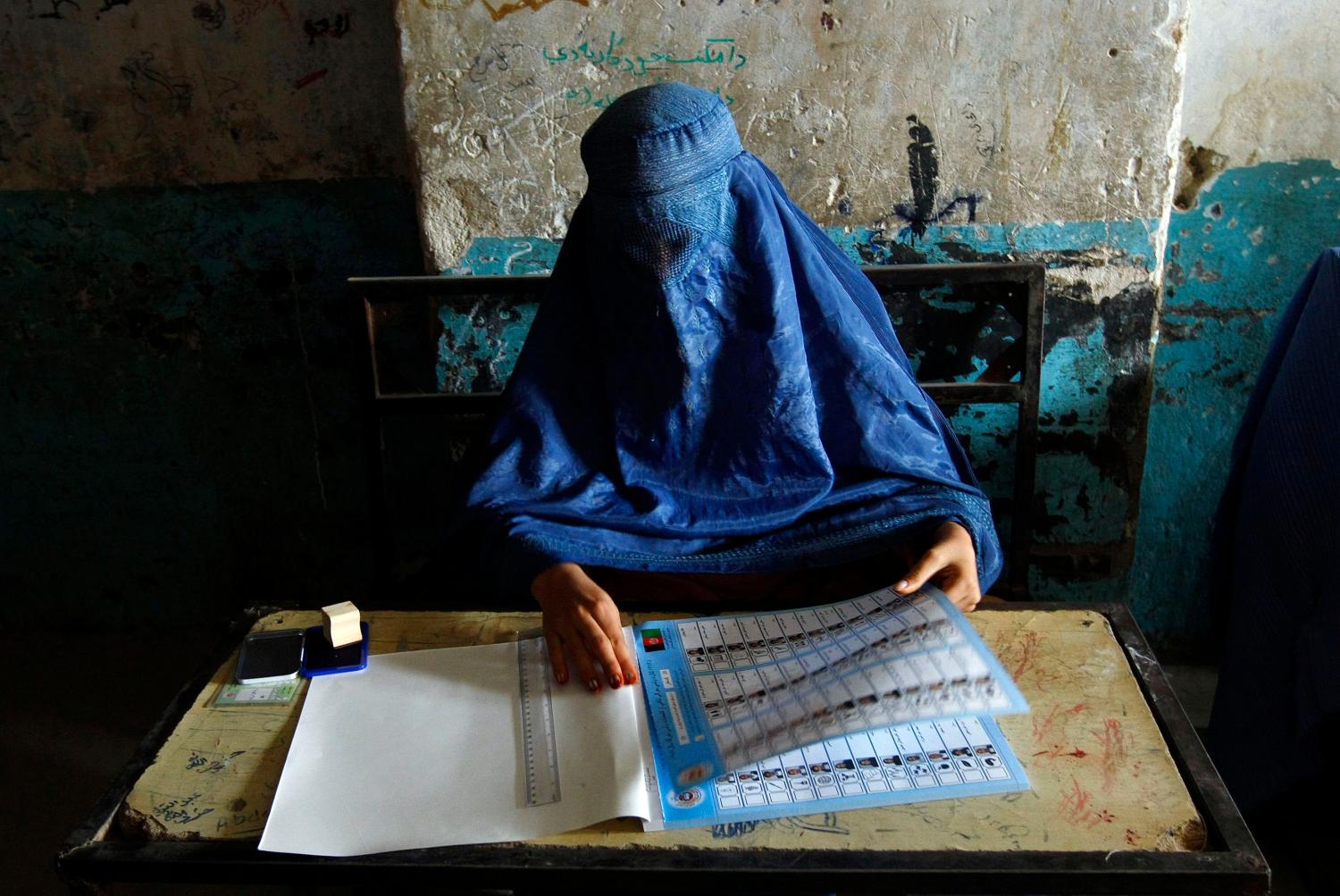This year’s Afghan presidential election is taking place as the departure of U.S. and international forces from Afghanistan approaches and as structural weaknesses in Afghanistan persist, imperiling a successful transition. Vanda Felbab-Brown argues that President Obama should adopt a multifaceted effort to support the elections and persuade Afghanistan to permit a continued and stabilizing U.S. military presence after 2014.
 |
MEMORANDUM TO: President Obama |
Summary and Recommendations
As the 2014 departure deadline for U.S. and international forces in Afghanistan approaches, structural weaknesses and deep worries about the country’s post-2014 future persist, imperiling a successful transition to a stable Afghanistan. As I described in last year’s memo, these deep-seated challenges include a precarious security situation, a severe economic decline and a profound legitimacy crisis of politics and governance. As these damaging dynamics continue, hedging behavior on the part of Afghan powerbrokers as well as ordinary people has intensified. The specter of another civil war looms, all the more so given the ongoing lack of clarity about a continuing U.S. post-2014 presence.
This year’s presidential election can provide a critical opportunity for a renewal of legitimacy, a boost in confidence and a start to correcting the ineffective and corrupt governance that characterizes Afghanistan. But the presidential election could also trigger extensive violence, a prolonged political crisis that paralyzes governance and the collapse of international support. It is therefore essential to focus on the election process and help make it broadly acceptable to the Afghan people.
Even as the United States and international community continue to lose visibility and leverage as troop withdrawal proceeds, they are hardly powerless. Their engagement can still be an important catalyst for security, political and economic progress in the country. And the United States can help steer the elections toward a successful outcome in multiple ways.
I recommend that you instruct your top officials to deploy patient, non-confrontational diplomacy with President Hamid Karzai to persuade him to sign the Bilateral Security Agreement (BSA) permitting a continuing U.S. military presence after 2014. We should also engage the many Afghan leaders and people who support the BSA, and mobilize partners with aligned interests from Europe, Russia, China and India to get Karzai to sign as soon as possible.
You should insist that the presidential election take place this year, even if with some moderate delay. The United States should provide technical assistance to election management bodies and all interested political parties and coalitions. We should deploy independent election monitors and help Afghan civil society to deploy their own. The United States must avoid picking winners or losers; Karzai has also demanded such noninterference as a precondition for his signing the BSA. Yet we must engage with Afghan politicians to facilitate consensus governance, especially if the election fails to produce a clear winner and the chance of violent contestation and paralysis dramatically increases.
You should task the U.S. military to assist Afghan security forces in designing contingency plans for dealing with any major outbreak of ethnic violence and for preventing security force contingents or militias from manipulating elections and facilitating fraud. International troop withdrawals should be suspended for the duration of the election period to enhance security. Finally, the United States should urge Pakistan to considerably boost its military presence along the border with Afghanistan, before and during the election, to prevent high levels of violence.
Background
In mid-2013, the Afghan National Security Forces (ANSF) took the lead in providing security throughout Afghanistan, which was an important accomplishment. Despite intense pressure from the Taliban, the ANSF did not buckle and did not cede territory to the Taliban. But it held on at the cost of intense, and likely unsustainable, casualty levels.
Equally important, the ANSF continues to be plagued by debilitating deficiencies, such as dysfunctional logistics, an inadequate medevac system, and intelligence and planning problems, as well as by ethnic and patronage fractures. Without continuing U.S. and international financing after 2014 and assistance in developing enablers and mitigating these fractures, the ANSF will likely weaken and splinter.
The Taliban insurgency faces its own difficulties. The possibility of Taliban negotiations with the Afghan government and engagement with the international community has triggered dissent, particularly among mid-level commanders and perhaps even among the group’s top leaders. Taliban indifference to civilian casualties and its callous willingness to treat fighters as cannon fodder may progressively delegitimize the movement with the Afghan people and create recruitment problems. Nonetheless, the Taliban insurgency continues to be entrenched and is nowhere near losing the capacity to retain influence and even territory in large parts of rural Afghanistan.
The lack of certainty as to whether the BSA between the United States and the Afghan government will be signed plays into the Taliban’s hands. Should a BSA authorizing the continued presence of U.S. and NATO forces after 2014 not be concluded because Karzai ultimately refuses to sign sufficiently in advance of the 2014 deadline, grave difficulties would ensue. The United States and the international community would be severely limited in their capacity to assist ANSF to redress its critical inadequacies.
The ability of the United States to secure its own critical interests in Afghanistan and the region—specifically, counterterrorism, regional stability, preventing a collapse of Pakistan and the leakage of its nuclear assets, as well as humanitarian goals—would also be jeopardized.
The existing crisis of confidence among the Afghan people about the post-2014 situation would deepen. Resurrection of detrimental parochial power and profit-maximization behavior among Afghan powerbrokers would intensify, bringing the country closer to entrenched violent conflict and civil war.
Self-interested rule by Afghan officials and powerbrokers has already characterized much of the past decade, eviscerating international efforts and the opportunity for political and social empowerment created by the overthrow of the Taliban regime. Serious crime, land theft and usurpation of other resources, nepotism, a lack of rule of law, exclusionary patronage networks and corruption (some of which is fueled by the large opium economy) permeate Afghanistan’s current political structures. Yet Afghans crave accountability and justice. They resent the current mafia-like rule. Improved human security and leadership accountability are their unfulfilled aspirations.
The presidential election provides an opportunity to break with this profound mis-governance. But the election can also go catastrophically wrong, deepening the domestic political crisis and governance paralysis, strengthening the Taliban and eroding international commitments to support Afghanistan after 2014.
Multiple threats can arise during the electoral process. At the extreme, the election could be canceled on the basis of insufficient security, perpetuating Karzai’s rule with ever-weaker legitimacy. Such a cancellation would likely trigger violent protests and even uprisings.
The election could also be so plagued by fraud that it deepens the legitimacy crisis of the existing political system. Taliban and Haqqani violence and voter intimidation by powerbrokers, militias, gangs or coopted security forces could facilitate fraud and potentially disenfranchise vast segments of the population, including southern and eastern Pashtuns. The losers could refuse to accept the outcome, particularly in regions of high ethnic and tribal fragmentation. In such areas, ethnic violence could easily break out, potentially generating deleterious pressures on ANSF sent in to quell the fighting, and precipitating the ethnic and patronage shattering of the ANSF.
Conclusion
Afghan political leaders understand that a highly contested presidential election can severely destabilize the country. Although much political energy has been spent on agreeing on a consensus candidate, or better, a set of consensus candidates, such political unity remains elusive. The most likely consensus candidate will be someone with a weak power base and thus less threatening to the dominant powerbrokers.
If Afghanistan is truly to seize the election opportunity to start addressing its deeply-rooted governance deficiencies, the new leader will have to be determined, powerful and adroit enough to take on the powerbrokers, even as he owes them electoral debts, and start delivering more efficient and accountable governance to the Afghan people. Otherwise, Afghanistan will merely get through the imminent crisis but not come out of its deep governance mire. The election will play a crucial role in determining which path Afghanistan takes. We can and must bring our influence to bear to ensure that the election is successful.
The Brookings Institution is committed to quality, independence, and impact.
We are supported by a diverse array of funders. In line with our values and policies, each Brookings publication represents the sole views of its author(s).




